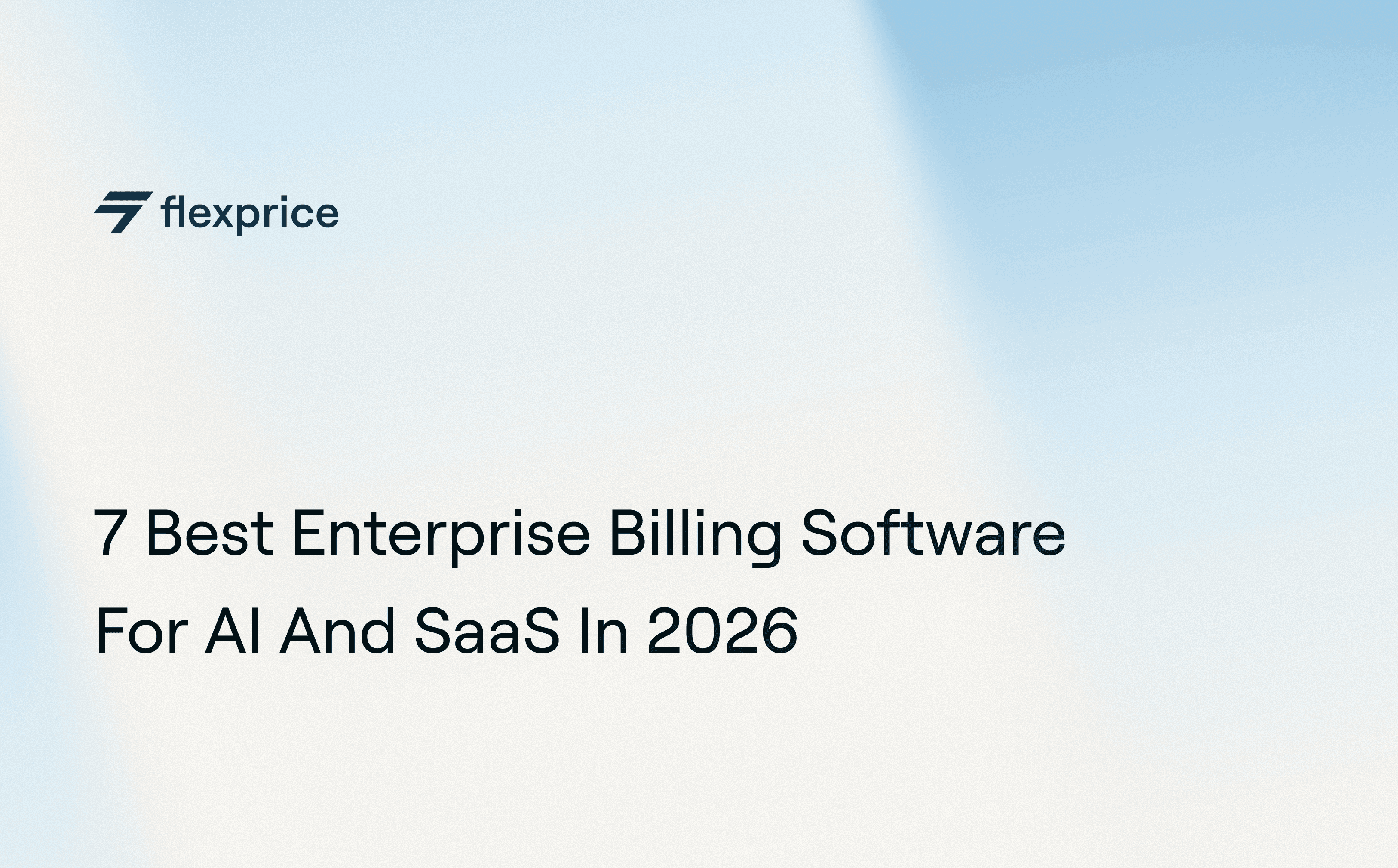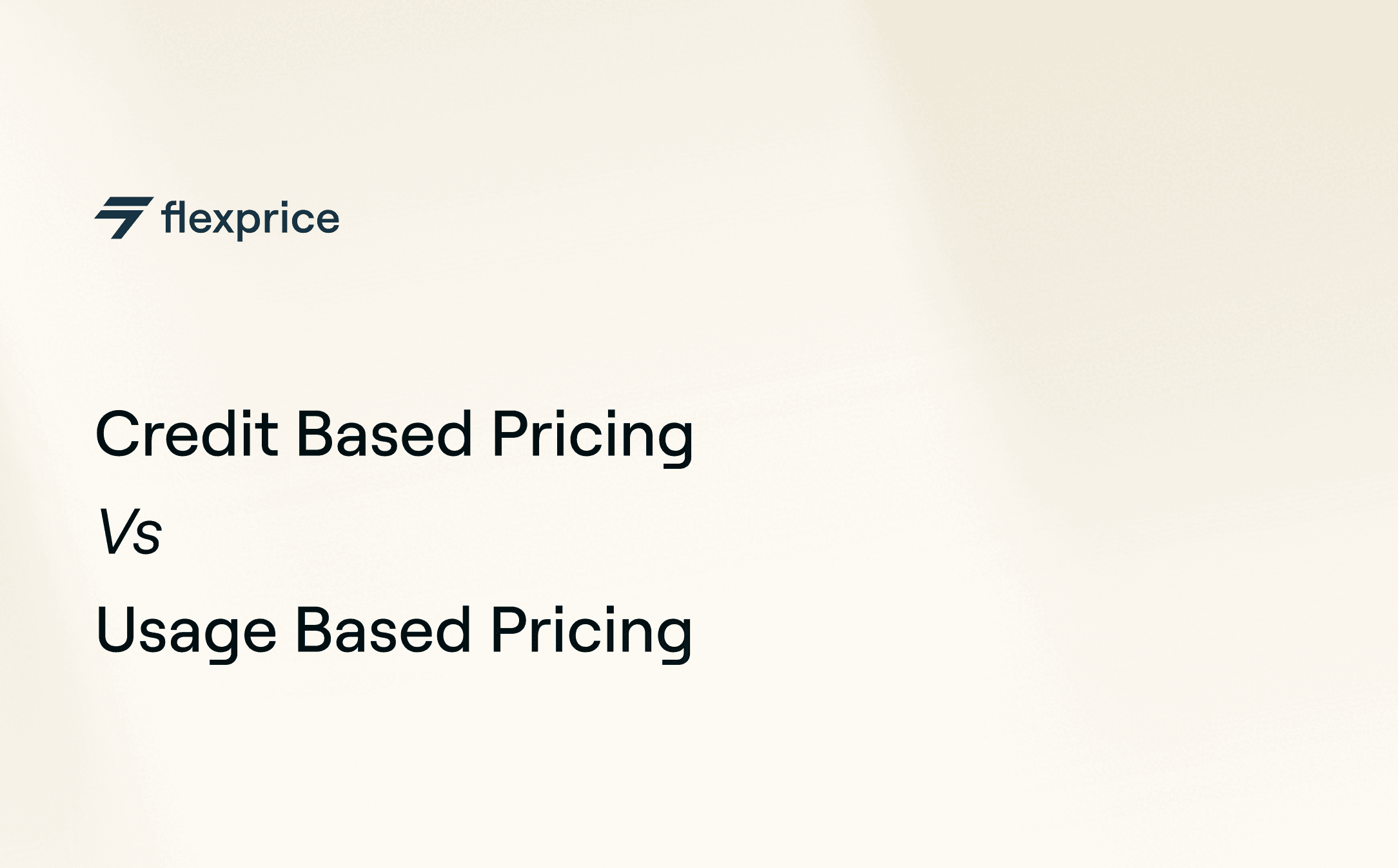 Aanchal Parmar
Aanchal ParmarCommit - Day 05 : Introducing Billing Workflows
Commit - Day 05 : Introducing Billing Workflows
Commit - Day 05 : Introducing Billing Workflows
Commit - Day 05 : Introducing Billing Workflows
Jul 4, 2025
Jul 4, 2025
Jul 4, 2025
• 4 min read
• 4 min read


Aanchal Parmar
Product Marketing Manager, Flexprice





You've been dumbing down your pricing to fit a tool, not your product. Instead of building the pricing model your business actually needs, you settle for what your billing system can handle.
And that’s why most SaaS companies start with simple usage billing, counting API calls, tracking storage, or measuring compute time. But as your product evolves, so does your pricing complexity.
You need to charge for daily active users instead of total events. You want session-based pricing that doesn't double-bill conversations. Enterprise customers expect calendar billing, and credit settlements become manual reconciliation struggles.
Traditional billing systems were built for straightforward sum-and-count metrics. The moment your business model demands more sophisticated usage tracking, you're forced to build custom infra.
Either hacking billing logic into your product code or managing it entirely outside your billing system.
More ways to define billable usage
Most default billing systems have sum or count and that works for basic usage. But the moment you need to bill for DAUs, session-based pricing, or latest snapshot metrics, your billing logic becomes unmaintainable.
You either start hacking it in your product, or tracking it outside the system entirely.
Flexprice now supports 3 new aggregation types that let you build usage billing models the way your product actually works.
Count Unique
Count Unique lets you track the number of distinct values for a property like user ID, session ID, or chat ID, in any billing period.
Let’s say you run a support tool like Intercom. Each incoming message triggers an event, but you want to charge once per conversation, not per message.
So you pass a chat_id property in every event.
If a conversation has 50 messages, Flexprice counts only 1 for that chat_id.Use cases:
MAU/DAU pricing (distinct user IDs per month)
Per-session billing (distinct session IDs)
Per-ticket resolution (distinct ticket IDs)
Per-project or workspace usage (distinct entity IDs)
Latest
We’ve added a Latest aggregation type to Flexprice’s usage meters.
This lets you capture the last value received for a specific event within the billing period, and use that as the billable metric. Without this, you'd need complicated internal counters or scripts to track end-of-period usage, leading to additional overhead.
Let’s say you're pricing your product like Amplitude, based on MTUs (Monthly Tracked Users).
Users log in, use the product, and generate events but you're only charging for the total number of unique users tracked at month-end.
Instead of tracking user join/leave events or keeping an internal counter, you just send:
{ event_name: "mtus",
value: 26730,
timestamp: "2025-07-31T23:59:00Z" }At the time of invoice generation, Flexprice picks this last value for the billing window and applies your pricing logic accordingly.
Sum with Multiplier
We've added a Sum with Multiplier aggregation type to Flexprice's usage meters.
This lets you apply different cost weights to the same event type based on resource intensity or complexity.
Without this, you'd need separate event types for every pricing variation, cluttering your tracking setup and making billing logic harder to manage.
Some customers trigger heavy workloads, others use light ones. This aggregation lets you apply a multiplier per event to scale pricing accordingly.
Let's take Cursor as an example. Every customer triggers a "Generate Code" event, but the computational cost varies based on whether they use the standard model or the reasoning-intensive "Thinking" mode.
Users running the same coding task might choose different AI models:Claude Sonnet 4 (Thinking) → 2x multiplier due to extended reasoning
Claude Sonnet 4 (Standard) → 1x multiplier for direct responses

Apply credits directly to invoices
Let’s say you grant a customer credits when they sign an enterprise contract $1,000 worth, upfront. Now their first monthly invoice is due. You want to deduct the invoice amount from the wallet credits they already have.
But without native support, here’s what your team has to do:
Check wallet balance manually
Update the invoice as “partially paid” via admin tools
Adjust wallet credits through custom scripts
Reconcile the ledger across three systems
And if anything goes out of sync, finance and support are left untangling the mess. Now you can apply wallet credits directly to open invoices in Flexprice.
With this you can settle part or all of an invoice using a customer’s existing credit balance. without needing to process an external payment.
Flexprice automatically updates wallet balances and invoice statuses, fully eliminating manual reconciliation scripts or custom admin tool adjustments.
Align billing cycle with calendar
By default, most billing systems follow anniversary billing, the subscription renews every month based on the date it was started.
But if your customers are signing up on the 3rd, 7th, 14th, or 28th, your invoices are all over the place.
This becomes even messier in enterprise setups where customers expect to be billed on the 1st of every month, and your billing system just doesn’t support it.
And now with Flexprice you can enable calendar billing. So you can choose between calendar and anniversary billing.
Wrapping up
These new aggregation types and billing capabilities solve the most common usage tracking headaches that force teams into custom hacks.
With Count Unique, Latest, Sum with Multiplier, credit settlements, and calendar billing, you can finally build pricing models that match how your product actually works.
→ If you have any questions, talk to us
→ Check what we launched yesterday
→ Sign up for launch updates to get future drops in your inbox
That's a wrap on launch week. Thanks for following along.
Get started with your billing today.
Get started with your billing today.


Aanchal Parmar
Aanchal Parmar
Aanchal Parmar
Aanchal Parmar heads content marketing at Flexprice.io. She’s been in the content for seven years across SaaS, Web3, and now AI infra. When she’s not writing about monetization, she’s either signing up for a new dance class or testing a recipe that’s definitely too ambitious for a weeknight.
Aanchal Parmar heads content marketing at Flexprice.io. She’s been in the content for seven years across SaaS, Web3, and now AI infra. When she’s not writing about monetization, she’s either signing up for a new dance class or testing a recipe that’s definitely too ambitious for a weeknight.
Share it on:



























